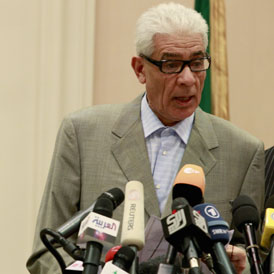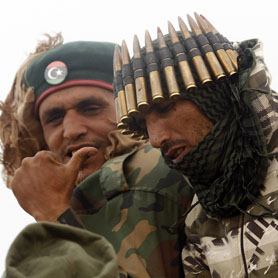Libyan foreign minister quits Gaddafi, arrives in UK
The Foreign Office confirms that one of the most senior figures in Gaddafi’s government, the Foreign Minister Moussa Koussa, has quit his post and is now in the UK.

A Foreign Office spokesman said in a statement that:
“We can confirm that Moussa Koussa arrived at Farnborough Airport on 30 March from Tunisia. He travelled here under his own free will. He has told us he is resigning his post.”
“Koussa is one of the most senior figures in Gaddafi’s government and his role was to represent the regime internationally — something that he is no longer willing to do,” the spokesman added, saying also that the British government was encouraging other Libyan officials to abandon Gaddafi’s posts.
Previously Koussa had declared a unilateral ceasefire under threat of UN resolutions saying that “Libya takes great interest in protecting civilians.”
Arming Libyan rebels considered, but what next?
Hillary Clinton, the US Secretary of State has refused to state whether the Americans will commit to arming Libya’s rebels fighting Colonel Gaddafi.
When asked by reporters whether any decision had been made, she said “no comment”.
As reports come out saying that President Obama has signed a secret order allowing for covert US support – and possible action by the CIA – to the rebels, pressure is growing on the coalition leaders to become more pro-active – especially in the wake of recent mass retreats by rebel forces.
But what could such support cost the coalition nations in the long term?
Lindsey Hilsum reports from Brega:
The rebels set fire to one of Colonel Gaddafi's old tanks before fleeing Ras Lanuf. It must have been satisfying to watch it go up in flames - but it doesn't alter the balance of forces in this war.
In Brega, sixty miles east, they were burning his green flag... but the news from the village in between was discouraging to say the least as rebels continue to flee from Gaddafi's soldiers.
US and British leaders say they might consider providing weapons - but others remember how the west armed the anti-communist mujahedeen in Afghanistan in the 1980s, only for them to morph into the Taliban and Al Qaeda.
Arming the rebels would certainly help oust Colonel Gaddafi although it might take some time. But the coalition leaders must now be thinking about the lessons of history.
Libya’s opposition rebels will be given communications devices, medical supplies and possibly transportation by allied powers, who have not ruled out the possibility of also stocking them with arms.
US President Barack Obama, whose air forces have been doing much of the heavy-lifting in western air strikes in the country, revealed on Tuesday that he has given the green light to provide non-lethal aid – and potentially transportation aid – to the Libyan opposition, who are attempting to bring Muammar Gaddafi’s 41-year rule to an end.
“We are going to be looking at all options to provide support to the Libyan people so that we can transition towards a more peaceful and more stable Libya,” Mr Obama said.
In echoing Secretary of State Hillary Clinton’s earlier comments, he added that the US will not ruled out supplying weapons to the rebels. “I’m not ruling it in, I’m not ruling it out,” he said.
Read more in the Channel 4 News Special Report on the Arab revolts
Mr Obama summarised the main objective of the allied campaign – which from Wednesday will continue under the auspices of NATO – is to apply steady pressure on Gaddafi so that he will “ultimately step down” from power.

The comment has been interpreted in some quarters as a clear ‘no’ to the question of whether Gaddafi is himself a target of military operations.
In fact, one of the major talking points to come out of Tuesday’s summit of foreign ministers and envoys in London is a seeming willingness from some sections to allow Gaddafi a safe passage to go into exile.
Foreign Secretary William Hague said that Britain may see the offer of exile as an option to end the crisis in Libya. He said that he would prefer to see Gaddafi brought in front of the International Criminal Court, but added that the dictator’s departure to a place of refuge abroad would bring about the kind of change that “most of the world and probably most of the Libyan people want to see”.
The news came as reports emerged of intense fighting on the frontline of the battle for territory – roughly in the geographical middle of Libya – between forces loyal to Gaddafi and the rebels.
The rebels, who had previously seized control of Bin Jawad, appear to have now lost it, after they were pushed back by Gaddafi forces.
If true, it is the second consecutive day that the rebels have lost significant territory, having been repelled from the outskirts of Gaddafi’s home town of Sirte on Monday.
According to the reports, the rebels have abandoned Bin Jawad and fled back towards the eastern oil town of Ras Lanuf in a convoy of hundreds of vehicles.
Closer to the western capital of Tripoli, Misrata remains under constant bombardment by pro-Gaddafi militia. Both sides have claimed to be in control of Libya’s third largest city, and international journalists suggest it that no one force is in command.